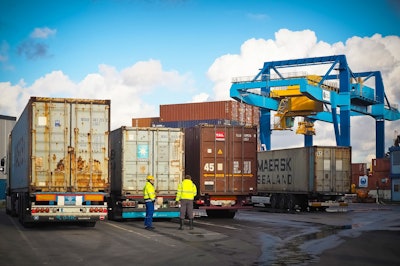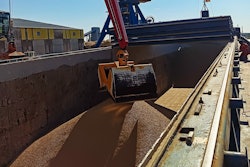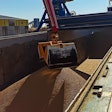
Some of thetransportation problemsthe feed and grain industry has faced over the past two years may be showing signs of easing, but one possible new threat is there: work stoppage on West Coast ports.
William Rooney, vice president for strategic development, Kuhne & Nagel, discussed the situation February 23 while speaking during theU.S. Department of Agriculture(USDA)Agricultural Outlook Forum.
Thee International Longshore & Warehouse Union workers (ILWU) and the Pacific Maritime Association (PMA) are still negotiating labor talks concerning a contract that expired on August 1, 2022. These negotiations have been going on since May 10, 2022. Because the ILWU is so large, should a strike result, its impact would be huge.
“If they don't work, the entire West Coast of the United States shuts down instantaneously," Rooney said. "Five minutes after that, the West Coast has problems, the Gulf Coast has problems, and Canada has problems. It's a big issue.”
Another union group, the ILWU Office Clerical Unit, has a presence in Los Angeles and Long Beach. While smaller in numbers, Rooney said it's “still very important.”
“It's a clerical union, and they also have the power to shut L.A. and Long Beach down,” he said. “They are very powerful in that sense, and their contract expires in June. At this point, there's nothing to know about it, but they have taken action in the past.”
Will a strike happen?
Despite those uncertainties, Rooney said he thinks the likelihood of a strike or work stoppage situation is pretty low. There have been small work stoppages where one facility was shut down for a day, but those were situations Rooney described as the union trying to get the attention of management.
“锁定是不可能,我认为太瓦o reasons that are important," he said. "One is political pressure. Now, there was more political pressure before the midterms. The president was involved. He went out there. The secretary of labor was there. The union and management made a joint statement saying, ‘we’re going to negotiate until we conclude without a work stoppage.' That political pressure went away somewhat after the midterms, but it’s still there,” he said.
The second reason Rooney has his doubts about a lockout is self-harm brought on by lost business.
He said striking workers “have been shooting themselves in both feet,” as about 4% of the containerized shipping market share has shifted to the Gulf or East Coasts from earlier strikes, and that business is not likely to come back.
‘A dumpster fire’ if a work stoppage happens
But should work stoppage occur, that would only be adding fuel to what Rooney described as a 'dumpster fire.'
“Transportation globally, regardless of whether it’s agricultural commodities or retail, has been a dumpster fire,” Rooney said.
“I’ve been in the business for 50 years in June," he continued. "And I tell people all the time that if I added up all they mayhem that happened in the first 48 of those 50 years, and multiplied it by five, it still would not come close to the craziness that we have all experienced in the last two and a half years."

















![Logan And Jerry Fitch[1]](https://img.feedandgrain.com/files/base/wattglobalmedia/all/image/2023/05/Logan_and_Jerry_Fitch_1_.6470faf6bcc37.png?auto=format%2Ccompress&fit=crop&h=112&q=70&w=112)




